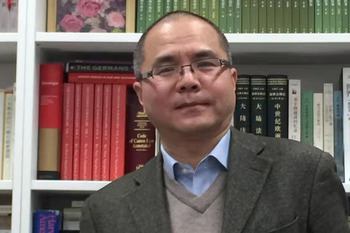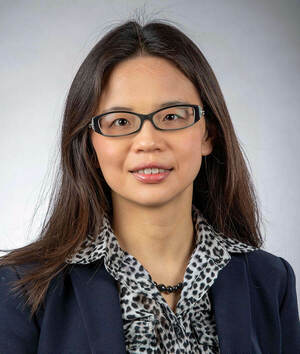Peking University-Notre Dame Colloquium Series: "Western Medieval History: Cross Cultural Perspectives"
Co-sponsored by Notre Dame's Liu Institute for Asia & Asia Studies and the Medieval Institute.
In this collaborative event between Peking University and the University of Notre Dame, Peng Xiaoyu and Felipe Fernández-Armesto meet to examine similarities and differences in how Western and Chinese scholars understand the Western Middle Ages. They'll ask what is included or excluded, emphasized or marginalized in work by Chinese and Western scholars and teachers, and the consequences for the curriculum at PKU and ND - all against the backdrop of a puzzle: Why are Chinese historians more interested in the Western Middle Ages than Westerners in the equivalent period in China?
This event will be moderated by Liang Cai, associate professor for the Department of History and fellow for the Liu Institute for Asia and Asian Studies, Notre Dame.
PLEASE NOTE: Indicated event times are Eastern Standard Time (9:00pm - 10:00pm China Standard Time).
Speakers
Felipe Fernández-Armesto

Professor Felipe Fernández-Armesto teaches at the University of Notre Dame, where he occupies the William P. Reynolds Chair. He was an undergraduate and doctoral student at Oxford (earning the highest honors), where he taught for twenty years before occupying Chairs in the University of London and Tufts University. Distinctions include Spain’s national prizes for research in geography and food writing, the Caird and John Carter Brown medals, the World History Association Book Prize, 2007, and many other prizes, distinguished visiting professorships, awards, and honorary degrees. He has been short-listed for the UK´s most valuable literary prize. According to Victoria Glendinning in The Times, he 'makes history a smart art.' His print journalism makes him 'one of the most formidable political commentators in the world' (- Jan Morris in The Independent). His broadcasting is 'the voice of reason' (- The Guardian). Reviewers have likened him to Montesquieu, Gibbon, Toynbee, and Braudel. He writes a regular food column in The Critic, and has many broadcasting credits, including screen-writing nine episodes of the CNN series based on his book, Millennium. Books include, most recently, Out of Our Minds (U. of California P., 2019), A Foot in the River (OUP 2015), Our America (Norton, 2014), 1492 (HarperCollins, 2010), Amerigo (Random House, 2007), and The World: a Brief History (Penguin, 2007). His work has appeared in twenty-eight languages. In 2017 the King of Spain granted him the Gran Cruz de la Orden de Alfonso X el Sabio for services to education and the arts.
Peng Xiaoyu

Professor Peng Xiaoyu teaches at the Department of History, Peking University. He graduated from Peking University in 1982 and later acquired his doctoral degree from the Catholic University of America in Washington D.C. He is a medievalist working in the field of the history of canon law, but his researches also touch on the history of Catholic social thought and that of American Catholicism. His publications include Social Evils and Common Good, Christianity and Modern Nation States in the West: A Case Study of American Catholicism, and Canon Law: History and Doctrines.
Liang Cai

Dr. Liang Cai received her Ph.D. from Cornell University and currently is an associate professor of history at the University of Notre Dame. She specializes in Chinese political and intellectual history. Focusing on Qin-Han dynasties(221 BCE -23 CE), the fountainhead of Chinese civilization, Dr. Cai’s publications cover Confucianism, bureaucracy, law, social networks, and archaeologically excavated manuscripts. Collaborating with computer scientists, Dr. Cai has been engaged in a digital humanities project that aims to create a structured biographical data and social network analysis of early Chinese empires.
Dr. Cai’s first book Witchcraft and the Rise of the First Confucian Empire contests long-standing claims that Confucianism came to prominence with the promotion of Emperor Wu in the Han dynasty. It was a witchcraft scandal in 91–87 BCE, she argues, that created a political vacuum and permitted Confucians to rise to power and transform China into a Confucian regime. Her book won the 2014 Academic Award for Excellence presented by Chinese Historians in the United States and was a finalist of 2015 Best First Book in the History of Religions presented by the American Academy of Religion. Dr. Cai is finishing her second book entitled Save the Empire from Serfdom?: Confucian Virtue, Emperor’s Law, and Convict Politics in Early Chinese Empires (221 BCE -23 CE). In the light of great divergence between East and West, this book attempts to answer a fundamental question in the formative age of Chinese bureaucratic empires ( 221 BCE -23 CE): could law or morality be sources of power independent from the government and thereby compete with political authority?
Originally published at international.nd.edu. Please check their listing for the most up-to-date details. While this event title, date, and time will automatically reflect any updates they make, this description section will not.